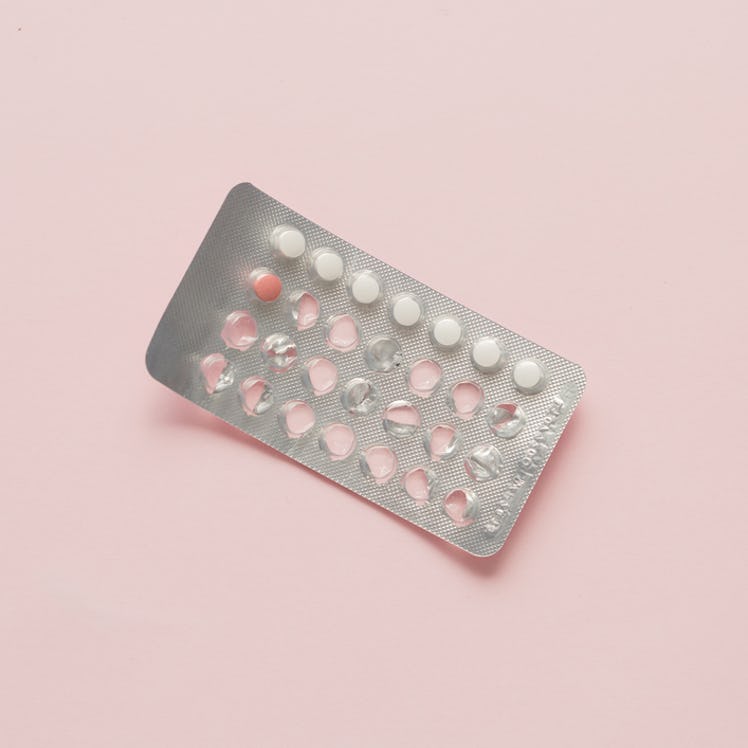
5 Things To Know About The Placebo Pills In Your Birth Control Pack Before You Skip Them
Popping pills is far from my favorite thing in the world, and I’m sure a lot of people can relate. The reason why I chose the birth control pill as my form of contraception for so many years remains a mystery to me, but here we are eight years later without a baby, so I guess it worked, right? Even though oral contraception clearly gets the job done, I'm sure if you're on the pill, you've wondered, can you skip birth control placebo pills every time a cycle reaches that stretch? I mean, why consume something that has no benefit whatsoever to your body?
The assumption that placebo pills don’t serve a purpose isn’t entirely true. Why would your doctor prescribe a pack of 28 pills, seven of which are just fillers? Answer: They wouldn’t. While it’s true that the final week of each pack of birth control features inactive capsules (in other words, sugar pills) that don't contain any actual hormones, all seven of them are included in the pack for a reason.
It turns out there are pros and cons to skipping birth control placebo pills. What it comes down to is how your unique body responds to your menstrual cycle, and how you want to cope with the symptoms. Here are a few interesting facts to consider before you decide what's right for your time of the month.
01Placebo Pills Were Designed to Mimic The Rhythm Method
Birth control pills were designed so that women who take them are on a 28-day cycle, whereas on a natural period, a woman's menstrual cycle would occur roughly every 25 to 32 days.
So while the active pills keep your hormones in check, the placebo pill creates what Ashley Spivak, co-founder of CYCLES + SEX, refers to as a "hormonal shift," causing your lining to weaken just enough to allow bleeding. She tells Elite Daily,
It is definitely not the same as having a period.
These placebo pills were created not for any scientific reason, but to mimic the rhythm method (otherwise known as natural family planning, when a woman tracks her menstrual history to predict when she will ovulate), and to make [menstruating women] feel like it was more "natural."
02You Can Skip The Last Week Of Pills To Skip Periods
Who says you can't outwit mother nature?
Before my wedding and honeymoon, I made a trip to my gynecologist to get some information on how to skip my period so it wouldn't interfere with my big day. While there are some contraception options that limit a woman's period to a few times a year, women taking the birth control pill can experience this little luxury, too.
Rather than take a week off from popping pills, skip the placebo stage and jump right into your next month of active pills. Healthline reports that doing so will replicate "the cycle of an extended or cycle birth control pill," in which you'll ultimately reduce or eliminate your period altogether.
If this is something you're interested in, however, be sure to speak with your doctor about whether or not it's right for your body.
03They Can Play A Role In Women's Health
Surprise! It turns out not all placebo pills are 100 percent sugar, ladies.
Sure, we can get away with skipping placebo week and still be protected from pregnancy. But, depending on the pill, we may miss out on some vital health benefits that only these pills can provide during our cycle.
Dr. Vanessa Cullins, Planned Parenthood's vice president of external medical affairs, told Vox that some placebo pills contain low-dose estrogen for three to four days out of the seven, which can prevent breakthrough bleeding. They may even contain iron, folic acid, and other vitamins necessary to keep a woman's body thriving.
04Just Because They're Inactive Doesn't Mean There's A Chance You'll Get Pregnant
There's a very small possibility you can get pregnant on your period, but it's not very likely, and here's why.
According to certified family nurse practitioner Sandy Knauf, five to seven days of placebos, instead of active pills, does not allot the female body enough time to shed the uterus lining and mature eggs before the next month's pack. Still, even though you might see this as a green light to forgo that last week of pills, you definitely want to use a condom for additional protection.
05By Not Taking The Placebo Pills, You Can Avoid Pesky PMS Symptoms
Prepare yourself, ladies, because Lauren Streicher, M.D., is about to rock your world.
In a 2016 interview with Women's Health, the associate clinical professor of obstetrics and gynecology at Northwestern University’s Feinberg School of Medicine and author of SexRx let it slip that she actually advises patients to skip the placebo week entirely because, as far as she's concerned, these pills have zero benefit.
Because taking birth control pills is essentially giving oral contraception total and complete control over our hormones, the so-called "period" we experience is actually a fake-out. Withdrawal bleeding is not the same as menstrual bleeding, which means every annoying — and in some cases extremely painful — PMS symptom is 100 percent unnecessary.
"There are actually benefits to not taking that week off from the hormones," Streicher explained. "For example, if you look at women who have things like menstrual migraines, endometriosis, [and] cramps, they’re much better off taking their pill pack straight through to not deal with those symptoms.”
So does that mean the last eight years of cramping, migraines, belly bloat, and fatigue was all for nothing? OK cool. Ladies, save yourselves.